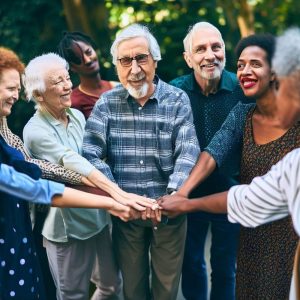Do you want to live a longer and healthier life? The key may lie in the relationships you build with others.
Studies have shown that social connections have a significant impact on our lifespan, with strong relationships contributing to better physical and mental health outcomes.
Loneliness and social isolation can have negative effects on your health. Research has found that individuals who experience prolonged loneliness are at an increased risk for developing chronic health conditions such as heart disease, depression, and dementia.
On the other hand, having meaningful connections with others can provide numerous benefits for both our physical and mental wellbeing.
In this article, we will explore the science behind these findings and provide strategies for building and maintaining meaningful relationships that can help support your longevity goals.
The Impact of Social Connections on Lifespan
 Feeling connected to others can make a world of difference in how many candles you’ll blow out on your next birthday cake. Scientific research has shown that social connections have a significant impact on lifespan.
Feeling connected to others can make a world of difference in how many candles you’ll blow out on your next birthday cake. Scientific research has shown that social connections have a significant impact on lifespan.
Studies have found that individuals with strong social ties tend to live longer than those who are socially isolated or lonely. But it isn’t just scientific research that highlights the importance of social connections for longevity.
Cultural perspectives also emphasize the significance of social bonds and their influence on lifespan. In many cultures, including traditional Okinawan communities in Japan, staying connected with family and friends is a central part of daily life and aging gracefully.
The benefits of maintaining strong social connections go beyond simply adding years to your life; they also enhance overall well-being and quality of life. So if you want to increase your chances of living a long and fulfilling life, prioritize building relationships with those around you – whether it’s reconnecting with old friends or joining a new community group.
Your body (and mind) will thank you for it!
The Health Risks of Social Isolation and Loneliness
The detrimental effects of being alone and disconnected from others can lead to serious health complications, such as depression and increased risk of mortality. Social isolation and loneliness have been linked to cardiovascular disease, cognitive decline, and even dementia.
If you’re feeling isolated or lonely, it’s important to take steps to connect with others. Here are four ways that you can prevent isolation and foster social connections:
1. Join a community initiative: Look for local groups that share your interests or volunteer at a charity organization in your area.
2. Foster connection in the workplace: Participate in team-building activities or organize social events with colleagues.
3. Attend social gatherings: Accept invitations from friends or family to attend parties or other social events.
4. Utilize technology: Video calls, messaging apps, and online communities can help you stay connected with loved ones who live far away.
Remember that staying socially engaged is crucial for maintaining good health throughout your life. Don’t be afraid to reach out for support if you’re feeling lonely – there are many resources available to help you build meaningful connections with others.
By taking small steps towards building relationships and fostering connections, you’ll not only improve your overall well-being but also increase your chances of living a longer life filled with joy and happiness.
The Benefits of Strong Relationships for Physical and Mental Health
When you prioritize and nurture your close friendships and connections, you’ll notice a significant improvement in both your physical and mental health. Positive psychology research shows that people with strong social ties are happier, more resilient to stress, and live longer than those who are socially isolated.
Simply put, having a support system of friends and family can help you feel better both physically and mentally. Emotional support from loved ones helps reduce the impact of stressful life events. When faced with challenges such as job loss or illness, individuals with supportive relationships experience less depression and anxiety compared to those without emotional support.
Moreover, studies have shown that positive social interactions can help lower blood pressure levels and boost immune function. Building strong relationships also promotes healthy habits like exercise, good nutrition, and getting enough sleep. Friends who share similar interests can motivate each other to stay active together or cook healthier meals instead of eating out regularly.
By prioritizing your social connections, you will be more likely to engage in activities that promote overall wellness while enjoying the company of people whose presence brings joy into your life.
Strategies for Building and Maintaining Meaningful Connections
To develop more meaningful relationships, try incorporating shared activities into your routine; research shows that people who regularly participate in group activities have a 74% higher chance of feeling satisfied with their friendships.
Finding balance is key when it comes to building connections – you want to invest enough time and energy into your relationships without neglecting other important areas of your life. One way to do this is to identify the priorities in your life and then intentionally schedule social activities around them. For example, if exercise is important to you, consider joining a running club or attending yoga classes with friends.
Overcoming obstacles can also be an important part of building meaningful connections. If you struggle with social anxiety or shyness, creative approaches can help ease the discomfort of meeting new people. One strategy is to join interest-based groups or clubs where you are likely to meet like-minded individuals who share common goals or hobbies. This not only increases the chances of finding friends with similar interests, but also provides a built-in conversation starter.
Finally, virtual connections have become increasingly popular as technology has advanced and our world has become more interconnected. While online interactions cannot replace face-to-face communication entirely, they can serve as a valuable supplement for maintaining existing friendships and forming new ones across distances. Social media platforms like Facebook and Instagram offer opportunities for sharing photos and updates about daily life, while video conferencing apps like Zoom allow for real-time conversations from afar.
By incorporating these tools into our social lives along with in-person activities, we can build stronger connections that last a lifetime.
Longevity and the Power of Community: Real-Life Examples and Success Stories
If you want to feel more connected and fulfilled in your life, hearing real-life examples of the power of community can inspire and motivate you to prioritize meaningful relationships.
Successful community initiatives have been found to positively impact not only individuals but also entire neighborhoods and cities.
For example, in a small village in Japan called Ogimi, where residents tend to live longer than anywhere else on earth, the sense of belonging is strong.
The villagers engage in activities like farming together and hosting festivals that bring everyone together, fostering a deep sense of connection.
Another example comes from the town of Geel in Belgium where people with mental illnesses are welcomed into local households for care.
This has created a unique sense of inclusion and connection for both the patients and their hosts.
In contrast, cultural differences in social connectedness can be seen between individualistic cultures like those found in Western countries versus collectivist cultures such as those found in Asia or Africa.
In collectivist societies, there is an emphasis on interdependence and family ties that provide support throughout one’s life.
Success stories abound when it comes to building communities around common interests or values.
From neighborhood gardening clubs to online groups centered around self-improvement or hobbies like knitting or hiking, finding others who share your passions can lead to deep connections that stand the test of time.
By prioritizing meaningful relationships and investing time into nurturing them, you too can experience the power of community in your own life.
What are the most effective ways to build strong social connections?
To build strong social connections, you must first understand that it’s not just about being friends with people. It’s about creating a community, a family outside of your own.
You need to exaggerate your efforts and go out of your way to be involved in the lives of those around you. Social media can help you connect but don’t rely on it solely.
Engage with people face-to-face by joining clubs or volunteer groups that share common interests. There’s no substitute for real-life interactions where you can truly get to know someone.
And don’t forget about family ties! Spend quality time with loved ones and make an effort to strengthen those relationships too.
By being compassionate, insightful, and engaging with others, you’ll create meaningful connections that will last a lifetime and extend beyond your immediate circle of friends and family.
Can social connections enhance cognitive function and memory?
Are you looking for ways to boost your cognitive function and memory? Brain training exercises can be helpful, but did you know that social connections can also play a significant role in enhancing these abilities?
Intergenerational bonding, such as spending time with younger or older generations, has been shown to improve cognitive performance. Additionally, community involvement allows for social interactions and the opportunity to learn new skills and information.
While technology has made it easier to connect with others, it’s important to maintain face-to-face interactions as well. By prioritizing social connections, you can not only strengthen your relationships but also improve your brain health.
How do social connections impact overall happiness and life satisfaction?
Having strong social connections can have a significant impact on your overall happiness and life satisfaction.
When you’re going through tough times, having a support system of friends and family to lean on can make all the difference.
However, the rise of social media has also brought about new challenges when it comes to building and maintaining these connections.
While it can be easier than ever to stay connected with people online, studies have shown that excessive use of social media can lead to feelings of loneliness and isolation.
It’s important to find a balance between staying connected digitally and investing in meaningful face-to-face interactions with loved ones.
By prioritizing social connection in your daily life, you’ll not only feel happier but also more fulfilled in your relationships.
What are some common challenges people face when trying to build meaningful relationships?
Building meaningful relationships can be challenging, especially if you’re trying to overcome loneliness. One of the biggest obstacles is building trust in relationships.
It takes time and effort to develop deep connections with people, and sometimes it’s hard to know who to trust. You may have been hurt in the past, or you might struggle with vulnerability. But remember that trust is a two-way street – you have to give it to receive it.
Be open and honest with others about your feelings and expectations, and take the time to get to know them on a deeper level. Don’t be afraid to step outside of your comfort zone and try new things – this can lead you towards meeting new people who share similar interests as yourself.
Remember that building meaningful relationships takes time, but it’s worth it in the long run for both your happiness and overall well-being.
Are there any negative effects of being too socially connected or having too many relationships?
When it comes to social connections, it’s possible to have too much of a good thing.
While being connected with others can provide emotional support and a sense of belonging, there is such a thing as being over-connected.
Social isolation can cause negative effects on mental health and wellbeing, but having too many relationships can lead to diminishing returns.
It’s important to find a balance in your social connections that works for you, so you can reap the benefits without feeling overwhelmed or stretched thin.
Remember that quality is often more important than quantity when it comes to building meaningful relationships.
You’ve learned about the incredible impact that social connections can have on your lifespan! By building strong relationships and maintaining meaningful connections with others, you’re not only improving your mental health and wellbeing but also increasing your chances of living a longer life.
Did you know that one study found that people who reported having strong social connections were 50% more likely to live longer than those who reported feeling lonely or isolated? That’s right – simply having close friends, family members, or a supportive community can significantly increase your chances of reaching old age in good health.
So don’t underestimate the power of human connection – whether it’s joining a local club or volunteering for a cause you believe in, there are plenty of ways to build meaningful relationships and improve both your quality and quantity of life.
Remember, taking care of yourself means taking care of your social health too!









